By Shiekh/Watu Datu Ibrahim, An Ulema in the Philippines
( A Preliminary Survey)
This article deals on Islamic Da’wah, in the Philippines it attempts to discuss the nature and content of the Islamic da’wah, and its fulfillment and problems implementation.
Nature of Islamic Da’wah
Also Read: Verses of the Universe in Gaza: The Unyielding Light of Faith
Da’wah is an Arabic word which literally means a call of invitation. It is usually used 2 mean invitations to a feast, i.e. “to invite people to join in delightful and happy life”
Islamic da’wah is an invitation addressed to all of mankind to order their lives according to divine will and it is invitation to all men and women to discover the truth in order to live delightful, peaceful and happy life. The missionary activities of the followers of other religions are also Da’wah since they are invitations to adopt their belief system. What makes Da’wah Islamic is its content.
Da’wah, according to Dr. Ismail Al-Faruqi, is to call man to return to himself. “ in commanding the Muslim to call men the path of Allah, He ( SWT) did not ask him to call men to anything new, to something which is foreign or unknown to them.
Islam is din Al Fitrah (religion naturalis) which is already present in its fullness in man by nature. It is innate, as it were a natural constituent of humanity.
Also Read: Prophet Sulaiman Alaihi Salam, the Greatest Muslim King of All Time
The man who is not homo religious, and hence homo Islamicus, is not a man. This Allah branding of his creation, namely, that He has endowed all men, as His creatures, with a sensus numinus a fitrah, which is to recognize Him as Allah Transcendent Creator Ultimate Master and One.
When a Muslim rediscovers “the innate knowledge which Allah has implanted in him at birth” he actually rediscover the truth. Rationally, it is necessary that truth has to be known. This is the reason why a Muslim is obliged to share his discovery with his fellow human beings by inviting them to the way of Allah the way the truth.
In calling others, Allah ordains that there shall be no compulsion (Qs: 2: 256). Since the objective of da’wah is the free acceptance of man that God is one, the creator and the Lord, this can be achieved with the free consent of the called.
Corollary to this ordinance, Allah prescribed the persuasive manner of calling. “ Call unto the way of thy Lord with wisdom and fair exhortation, and reason with them in the better way.” (Qs: 16: 35) if those called do not reapond to the invitation, they must be left alone.
Also Read: Imaam Yakhsyallah Mansur: Surah At-Tin Indicates the Command to Liberate Al-Aqsa
Islam execrates also da’wah that takes advantage of the needs or weakness of man since this negates his freedom to think and to argue. Da’wah is valid only if there is free and conscious acceptance by the called. The used of tricks and any form of deception does not merely invalidate da’wah but is evil.
Da’wah is directed to non-Muslim as well as to Muslims. The invitation to non- Muslims is to join the ranks of those of who believe in the Islamic way of life, and the da’wah addressed to Muslims is to press them to actualize the Islamic way of life as prescribed in the Qur’an and the Sunnah of Prophet Muhammad Shallallahu Alaihi Wasallam.
It is not enough that a Muslims believes in Islam for “Islamicity is never a fait accompli”, but he has to actualize also the pattern of life prescribed by Allah. The concern of Islam is not confined to purifying the soul and laying down moral principles but it extends to the entire breadth of life.
Another reason why da’wah is also directed to Muslims is because Islam is always opened to new evidence, to new alternatives. And it is through da’wah that process of critical intellection among Muslim are stimulated. The Muslim’s Imam, Dr. Al-Faruqi points out, “should be dynamic and always growing in intensity, clarity of vision and comprehensives,” he expalins further.
Also Read: Imaam Yakhsyallah: Nurture Love for the Prophet, One Will Be with Whom One Loves
“Conversion to Islam is not a sacrament which once it takes place, becomes an eternal fait accompli. Islam knows to “justification by faith”, certainly of no ‘justification’ is justi facti.
If lethargic and stagnant, iman degenerates into narrow -mindless and gradually impoverishes its object. On the other hand, its dynamism its openness to knew knowledge, new evidence and new life-situation, new data, problems, as well as creative source of inrichment for the subject.
The message of the da’wah is Tauhid or the witnessing that there is no God to be worshipped but God. It is the essence of Islam. In its literal sense, tauhid signifies as relationship with only one that excludes similar relationship with others.
It is the acceptance of man that Allah is his creator and his sovereign Lord. Hence, man commits himself to the will of Allah and aknowledges His sovereignty. Correspondingly, he rejects all sources of laws and values other than Allah, and refuses to render obedience to any authority other than the authority of Allah.
Also Read: Friday Sermon: Emulating the Firmness of the Prophet in Struggle
These are the teaching that all prophets preached. Accordingly, the invitation that Muslims extend to the people is the unconditional aknowledgement that Allah is the creator, the Allah, the Master and the Law giver.
These attributes of Allah must be emphasized because there are people who do not deny the existence of Allah and accept that He is the creator of the heavens and the earth but reject him ad their master and Law-giver.
This is evidently shown that they bow down before God to worship but submit themselves to the absolute authority of men outside the precincts of the places of worship.
Ineffect, it is the doctrine of tauhid that liberates men from the dominations of the other men since no man has the right to claim the obedience of other men, that right belongs solely to Allah. This is the message that goes with the invitation to mankind to join the ranks of those who are in the path of Allah.
Also Read: Imaam Yakhsyallah: Muslims Unity as Key to Victory of Islam
Fulfillment of Da’wah in the Philippines
The Muslims in the Philippines, despite of their pre-occupation in the defense of their community, are fulfilling God’s commandment to call all men to His way. The resultant effect of their da’wah activities are heightened Islamic consciousness of the Muslims in this country and many non-Muslims have joined the ranks of the believers in Islam.
The response of the Muslims to da’wah is seen in the increased number of attendance during jamaah prayers and young Muslims do not only show concern of their domestic problems but including that the ummah in general.
The increasing number of Islamic organizations, both in the national and local levels, although sometimes awareness. An observer, the late Dr. Peter G. Gowing. a Christian missionary who worked in the Muslim community attested to this growing Islamic awareness.
He observed that “Muslim Filipinos are attentive to da’wah-the call’ of Islam, a call to greater awareness of what it means to be a Muslim of what Islam requires and of the obligation to assist in the transmission of that call to others, both Muslims and non Muslims New Muslim communities are emerging in Metro Manila and in central and northern parts of the country.
Also Read: Friday Sermon: Prophet Muhammad Is Not a Political Figure
These communities are composed not only of Muslim migrants from the south but sizeable number of those who newly embraced the faith. There is no official figure as to the number of those who newly embraced Islam but it is safe to assume that it is within the range of tens of thousands.
All these point to the fact that da’wah in the Philippines is breaking grounds.
Problems
There are four problems identified by Shiekh in his article which are experienced by da’ wah workers in the Philippines.
Also Read: Without Knowledge, Congregation Is Merely a Crowd Without Direction
This does not mean that other problems are of less importance but I submit those are the fundamentals ones.
First, the dualism on how Muslims conduct their individual and communal affairs is one of the problems that hinder the progress of da’wah in the Philippines.
This problem can be found among Muslims who have nothing common with Isłam except the accident of birth. They profess to believe in the kalimah, “la ilaha illa Allah, Muhammadar Rasul Allah” yet the belief does not manifest in their lives.
They seem to forget that the belief in the unity of Allah implies that the “beliefs and ideas of individuals, their devotional, acts and religious observance, and their social system and their world affairs they are motivated with material interests alone which is antithetical to the Islamic teaching that all affairs of a Muslim must be based on worship of God.
Also Read: Friday Sermon: Grateful for Indonesia’s Independence by Supporting Palestine’s Freedom
There are also Muslims who take a pride of possessing the best code of morality but they demonstrate immorality in their conduct. In a situation like this, what will attract non-Muslims to adopt the Islamic system of life (or what will prevent Muslims youth to adopt other ideologist) when they cannot see from the Muslims any distinctive difference between Islam and other religion or ideologies.
Second, da’wah works are left to few workers and organizations. Those who are conscious that da’wah workers and organizations and to them that is a fulfillment of the obligation to do da’wah. Others assume that it is not their responsibility but that of the so- called missionaries employed by Muslim countries.
The effect of this attitude and practice is da’wah becomes a profession to some da’ees and it creates a new class in the Muslim society, the class of missionanies or “tabligh” and those in the “profession” look at other Muslims who do da’wah works with suspicion because it is an encroachment into their professional domain”.
Consequently, this leads to the bifurcation of Islam into spiritual and mundane spheres, the spiritual is the concern of one group while the worldly affairs is the exclusive concern of another group. This practice is an alien to Islamic da’wah. The call to the path of Allah is both individual and collective duty of the Muslims.
Also Read: The Bestial Nature of Netanyahu
Third, the da’wah messages being propagated cater only to the spiritual needs of man Islam has never been presented as a complete way of life. The Islamic alternative solutions to the problems of poverty, under development, injustice, imperialism and other human problems have been introduced as da’wah messages.
On the other hand, some da’wah workers engaged people of other religions in polemical confrontation on religious issues which are not meant to be resolved because they involved the interest of some people It is a waste of time and energy to engage in these kind of discussion.
The muslims should face the problems of humanity for in the final analysis the religion that can offer acceptable solutions to these problems is the faith that the people will ultimately accept.
Fourth, another problem is that da’wah is focused to the masses, they seem blind to see the unlslamic doings of those in the upper class of the society.
Da’wah should be address to classes of the society, including the leaders of the community respond to the call of Islam, most likely the system under their control will also respond.
Recommendations
Da’wah is obligatory to every Muslim. It’s implementation should not be let to few individuals but every Muslim must be the agent of da’wah. It is recommended that da’wah organization designs training programs that will make every Muslim man and woman a da’i and to make da’wah part
of everybody’s daily life.
The core of the training program as actualizatian of the Islamic way of life. An agriculture technician who brings to the people the technology of modern farming and Islam is more efective da’i than a madrasah teacher who can only explain the Qur’an its literal meaning.
Factory workers, classroom teachers, managers, government employoes, student, labor, leaders, social workers, youth leaders are reservoir of effective da’wah agents.
The effectivity of da’wah is the involvement of everybody and it becomes a people’s movement. The message of da’wah must answer to the needs of the people.
The Islamic solutions to human problems are what should be presented rather than the trivial religious issues.
To concretize these proposals da’wah organizations and concerned individuals should convene a conference to frame up plans and programs of actions for the realization of the objectives of Islamic da’wah in the Philippines. (AK/RE1)
Mi’raj News Agency (MINA)






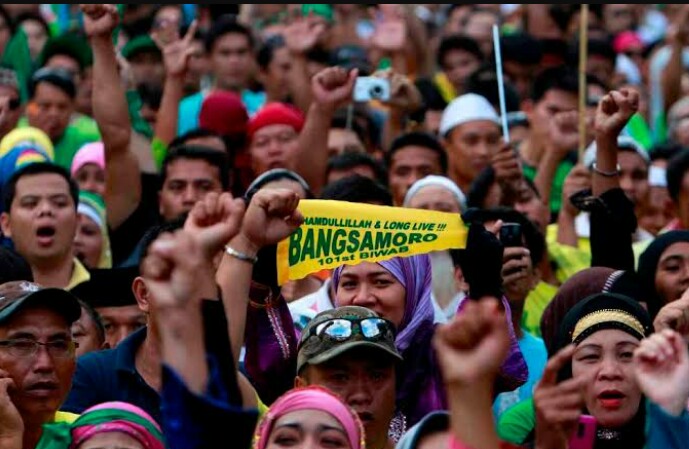









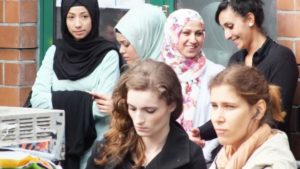
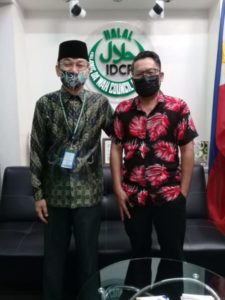


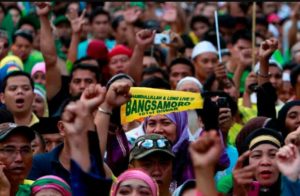
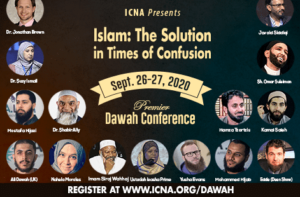













 Mina Indonesia
Mina Indonesia Mina Arabic
Mina Arabic